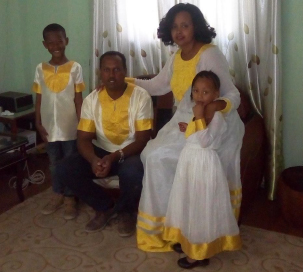As a child I used to dream of what it would be like if we could really have twelve days of Christmas. After all, if one Christmas was the best day of the whole year, how much better would it be to have twelve back-to-back? Ethiopians must agree, because they take a solid FORTY-THREE days of Christmas.
to have twelve back-to-back? Ethiopians must agree, because they take a solid FORTY-THREE days of Christmas.
Our friend Fasika works with our Ethiopian partner: Water Life, and like many of us, Christmas is his favorite time of year. But Ethiopia is a world away from the United States, and they have their own traditions to celebrate the season.
Fasika’s community delights in the sacred feelings of Christmas, but does so in a place where long term safe water is still emerging, and while simultaneously praying for deliverance from potential violence and constant political unrest.
For these reasons, the extra hope sensed at Christmas brings Fasika a great depth of gratitude. As in the US, Christmas in Ethiopia is both a religious and a cultural celebration, and both cultures enjoy a prelude to the big day. Americans probably wouldn’t consider the Ethiopian practice of Advent fasting for the 43 days leading up to Christmas as festive. Instead of cookie exchanges, shopping days and office parties, Fasika and his family partake in just one daily, vegan meal during this time, known as the ‘Fast of the Prophets’ (“tsome nebiyat”).
Unlike a calendar full of chocolate eaten one day at a time, the sense of deprivation from such a long fast doubtlessly builds anticipation for the celebration and feast on Christmas day, called “Ganna,” which is celebrated by the Ethiopian Orthodox Church on January 7. It seems almost the inverse of how many Americans celebrate, considering how many of us are 7 days deep into a new-year’s diet in an attempt to atone for the previous month of feasting by the time it’s Christmas in Ethiopia.
Similar to candle-lit Christmas Eve services in the US, Fasika’s church holds a service the night before the big day, but his begins at 6 p.m. and lasts until 3 a.m. This is the “gahad” of Ganna. The people all wear a traditional thin white garment with colorful stripes at the ends to this service. It resembles a shawl or toga, and is called a netela. When the service concludes at 3 a.m., the congregation ends their fast and celebrates by feasting on meat, dairy, eggs and more, with their family and neighbors. It strikes me as perfect, how both of our cultures celebrate Christmas first thing in the morning as a reminder that when our loving God sent Jesus, he ushered in a brand new day for all humanity.
Whether you write cards to long lost friends, eat cookies and sleep in, or sit through 9 hours of church before a magnificent breakfast, as you celebrate Christmas and the beginning of a new year, Water 4 wishes you happiness and the warmth of family. In Ethiopia, Fasika tells us the concept of family is extremely important and does not necessarily require blood relation. One’s family is revered and cherished as a gift directly from God. We agree, and are grateful for each of you in our Water4 Family across the globe.



